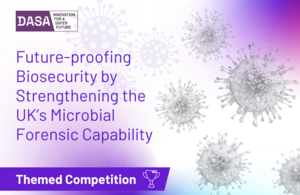Enhancing UK Biosecurity: DASA Launches Microbial Forensics Competition
DASA and UKMFC seek novel technology options to enhance the UK’s Microbial Forensic capability

- DASA has launched a new Themed Competition: Future-proofing Biosecurity by Strengthening the UK’s Microbial Forensic Capability
- This competition is funded by Dstl for the UK Ministry of Defence (MOD)
- The total possible funding available for this competition is £1 million (excluding VAT).
- Competition closes midday on Tuesday 18th February 2025 (GMT)
On behalf of the Defence Science and Technology Laboratory(Dstl), the Defence and Security Accelerator (DASA) is pleased to launch a new Themed Competition called Future-proofing Biosecurity by Strengthening the UK’s Microbial Forensic Capability. The competition is being run in response to the 2023 UK Biological Security Strategy which aims to implement a UK-wide approach to biosecurity that will strengthen deterrence and resilience to a spectrum of biological threats.
Dstl is leading the creation of the United Kingdom Microbial Forensics Consortium (UKMFC) which is being developed in support of the Detect Pillar of the Biological Security Strategy. It will comprise a network of biosurveillance laboratories from all four nations of the UK, operating under a One Health doctrine. This competition seeks novel technology options or technical approaches that can directly support the UKMFC initiative.
For definitions of One Health see:
World Organisation for Animal Health
Read the full competition document to learn more.
Key dates and funding
The total possible funding available for this competition is £1 million (excluding VAT). We are looking to fund a minimum of 4 and up to 10 projects, each up to a maximum value of £250,000. The deadline to submit a proposal is midday (GMT) on 18 February 2025. Submit via the DASA Online Submission Service.
Background
The aim of the competition is to strengthen UK capability in the field of Microbial Forensics. Novel technology options are required to function within the context of the UKMFC laboratory network; an appropriately resourced, high technological infrastructure, staffed by subject matter experts in biosurveillance. Innovations that either augment current approaches (e.g. increasing the speed and / or opportunity for anomaly detection through genomics) including novel uses of technology platforms or that provide completely new avenues for a Microbial Forensic investigation are of interest.
Any new capability should not increase the risks encountered in the day-to-day activities of a laboratory, or significantly increase the financial burden encountered by a laboratory (above normal investment patterns). There is no interest in technology development that would provide a solely mobile Microbial Forensic capability or enhance a laboratory’s ability to simply identify a pathogen.
Dstl provides expert scientific advice and deployable capabilities which directly support resolution of some of the most challenging national security incidents: those involving explosive, chemical or biological materials. Dstl hosts the UK’s only sovereign Chem-Bio capability used to analyse and understand the world’s most deadly pathogens and biological weapons.
What are the technology challenges we would like addressed?
There is particular interest in funding new research in the following areas:
-
Computational tools that improve the opportunity to detect anomalies in genome sequencing data, including evidence of biological engineering.
-
Technologies that allow the identification and / or computational analysis of other omic signatures for novel Microbial Forensic capabilities.
Ideally any new capability would be agnostic of the sector, sample type, and class or type of biological agent being analysed. However, technical approaches that are specific to certain types or classes of biological agent may be considered. We are also interested in proposals that develop or repurpose existing technologies used in other scientific disciplines.
We are looking for innovations that will form the basis of the next generation of Microbial Forensic capability, potentially enhancing our ability to use any branch of science under the omics banner in a Microbial Forensic investigation, and fundamentally improve our understanding of an encountered pathogen.
Learn more about the competition and submit a proposal here.
Supporting events
Thursday 9 January 2025
A dial-in webinar providing further detail on the problem space and a chance to ask questions in an open forum. If you would like to participate, please register on the Eventbrite page here.
Wednesday 15 and Tuesday 21 January 2025
There will also be one-to-one teleconference sessions on 15 and 21 January giving you the opportunity to ask specific questions to the competition team in a closed forum. Registration details for these sessions will be published the day after the dial in webinar session, i.e. on 10 January 2025. Booking will be on a first come first served basis.
Please attend the dial-in session on 9 January 2025 or reach out to your local Innovation Partner if you have more general questions on DASA the application process.
Submit a proposal
We want novel ideas to enhance the UK’s Microbial Forensic capability. Can you provide innovative solutions? If so, please read the full competition document and submit a proposal.